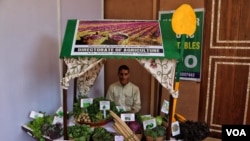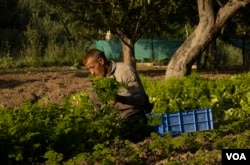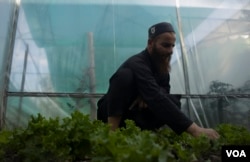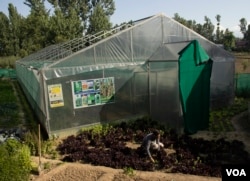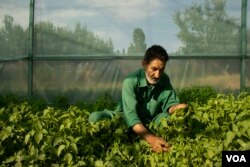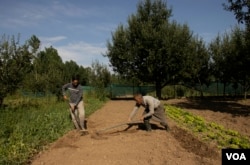Farooq Ahmad Gannie’s one-hectare of land in the Tahab area of Pulwama district, located on the Indian side of Kashmir, is covered with orchids at the front and paddy fields at the back.
Five years ago, the land was once a flourishing apple orchard. However, the 70-year-old landowner made the decision to convert it due to the decade-long decline in apple prices.
“The prices of various commodities soared but to my dismay the price of an apple box kept decreasing,” Gannie told VOA. “After carefully crunching the numbers, I realized that I would incur substantial losses over the next five years. Therefore, I made the decision to switch from inherited horticulture to agriculture,” he explained.
The land transformed by Gannie introduces a concept new to the Indian side of Kashmir called exotic farming. This is the cultivation and growing of non-indigenous or non-traditional plants.
“I felt the need to do something new, but I was unsure about what to do. I went to the local agriculture office in Pulwama and learned about exotic farming,” Gannie said. “The idea fascinated me, and I saw it as an opportunity to earn money round the year during challenging times,” he added.
The farm, Gannie said, produces vegetables such as parsley, broccoli, lettuce, mint, celery, purple cauliflower and yellow zucchini, to name a few. He says he supplies the carefully grown vegetables to several vegetable wholesalers and retailers in different parts of the valley.
“There is a high demand for these vegetables in Kashmir. I cultivate and sell the crops quickly,” he said.
Gannie said that in the past people would buy these vegetables at high prices from the market because they were imported from outside Kashmir. However, now that these vegetables are being produced domestically, people are able to purchase non-indigenous vegetables at a more affordable cost.
Mehraj Ahmad Dar, 32, a sociology post-graduate, told VOA the establishment of exotic farming has provided job opportunities for unemployed youth like him in a region where there are few opportunities.
“I did not find a job in either government or private sectors. Fortunately, I was introduced to Gannie who was in need of employees to assist him on the farm,” Dar said. “Currently there are six people working together on this farm,” he said, mentioning each of them earns $350 per month.
Exotic farming, according to Dar, differs from traditional methods as it involves cultivation of non-indigenous plants in a controlled environment such as greenhouses or net-houses.
“These plants or vegetables do not always require greenhouse conditions for optimal growth,” Dar said. “Controlled temperature is required until seeds sprout into saplings,” he added.
Mohammad Rafiq, 60, who transformed a small patch of orchard land into an exotic farm at Tahab, told VOA that instead of large-scale traditional crops production he opted for exotic agriculture for two reasons — tourists prefer vegetables that are familiar to them and the sale of apples was not as profitable.
“Currently only a few individuals have gone for exotic farming making our district the epicenter of this new agricultural practice,” Rafiq said. “The nutritional value of these vegetables has significantly contributed to the growing demand for non-traditional crops,” he said, adding that exotic farming is the future.
The Gross State Domestic Product (GSDP) of Jammu and Kashmir is primarily dependent on the agriculture and horticulture sectors contributing 20% and 10% respectively to the economy.
Conversion of land for exotic farming, Rafiq said, wouldn’t affect the horticulture sector. Instead, he said the new concept would enhance the economy of the region.
“I acknowledge the significance of the horticulture sector in our economy, but we cannot deny the role of agriculture in uplifting Kashmir’s GSDP,” Rafiq said. “In 1996 agriculture accounted for 35% of our GSDP but in recent years that figure has decreased to 20%,” he said, adding that agriculture sector requires a “lot of attention.”
Shahnawaz Ahmad Shah, agriculture officer of the Pulwama district, told VOA the government is committed to promoting exotic farming in Jammu and Kashmir.
“Agriculture Production Department has launched the Holistic Agriculture Development Policy, which includes a project for promoting exotic vegetable cultivation with a $4 million grant,” Shah said. “The department has supported this cultivation through quality seeds and hi-tech poly-green houses on subsidy, benefiting the agriculture sector,” he added.




